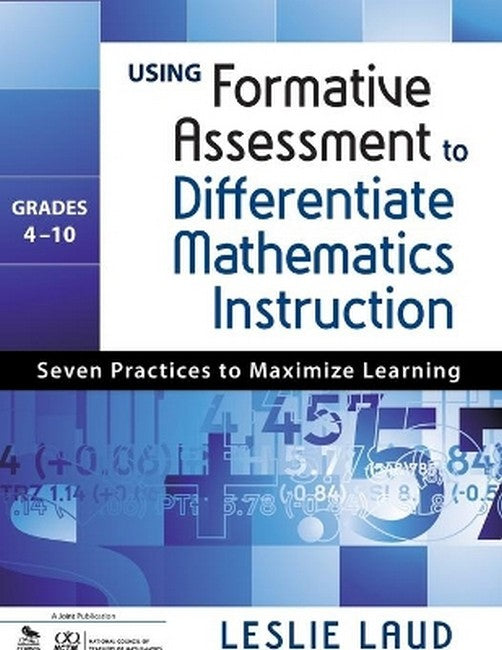Leslie Laud has differentiated math instruction in her own classroom and in her co-teaching with her math colleagues, and has been doing so for almost two decades. She teaches an online course on Differentiated Middle School Math Instruction at Bank Street College of Education. Additionally, she has presented at many conferences both nationally and internationally, including The National Council of Teachers of Mathematics annual conference. She has also published many articles in leading journals such as Educational Leadership and Teaching Exceptional Children. She currently leads staff development groups with teachers in school systems in the Boston area. She received both her doctorate in curriculum and instruction and her master's in special education from Teachers College, Columbia University.
Request Academic Copy
Please copy the ISBN for submitting review copy form
Description
List of Figures Preface Acknowledgments About the Author 1. Getting Started and Establishing Norms Getting Started Establishing Class Norms 2. Formative Assessment What is Formative Assessment? Where Am I? Involving Students in Self-Assessment Where Am I Going? Conveying Criteria or Learning Targets How Will I Get There? Providing Feedback Impact of Assessment on Confidence and Motivation 3. Tiered Instruction What Is a Tiered Lesson? Tiering by Student Characteristics Tiering by Instructional Characteristics Tiering Existing Textbook Lessons Creating a Tiered Lesson 4. Supporting Students Who Are Low Achieving Differentiating Instruction in Basic Facts Differentiating for Conceptual Understanding Differentiating Procedural Support 5. Challenging Students Who Are High Achieving Exemptions Based on Prior Knowledge and/or Pace of Learning Opportunities for Higher-Order Math Strategies to Avoid Importance of Challenge 6. Time-Saving Management Strategies Planning Lessons and Units Managing Students Working on Different Tasks Assigning Homework Grading Wrap-Up Suggested Resources References Index
"This practical and thought-provoking book offers time-saving strategies essential for every teacher in every discipline. The numerous self-assessments demonstrate that the best formative assessments are not merely given "to" students but are an interactive learning experience involving students, teachers, and professional colleagues." -- Douglas B. Reeves, Founder "Leslie Laud offers practical support for using formative assessments to inform teachers and students. Her book shimmers with real kids, real classrooms, and real teachers, and includes creative activities that provide both differentiated lessons and opportunities for ALL students to learn." -- Glenda Lappan, University Distinguished Professor "This book provides a wealth of information for teachers and mathematics leaders to consider when implementing intervention models, RTI programs, and differentiated instruction for low achievers through high achievers." -- Don S. Balka, Professor Emeritus "Leslie Laud has created a very readable and comprehensive guide to understanding what formative assessment is and how to use it to meet the needs of students in the mathematics classroom. She offers many specific examples, covering a variety of approaches teachers can use. What is particularly noteworthy is her recognition that different teachers need to come at this work in different ways - that differentiating instruction is not just for students, but for teachers, too." -- Marian Small, Author and Professional Development Consultant "Leslie Laud provides practical applications in mathematics assessment and instruction. She uses many vignettes and examples to paint a picture seen in many classrooms today. Throughout the book, Laud includes little gems that help with such areas as motivational strategies to self-determinism to ideas for visual representations. The many teacher tips and sound solutions will support those who are implementing RTI in mathematics. -- Brad Witzel, Associate Professor of Special Education "Leslie Laud shows the importance of the link between formative assessment and differentiated instruction. There is a limited body of work that combines these two constructs, and that connection makes this book powerful." -- William Farber, Professor of Mathematics Education "I learned a great deal and plan to make some changes in my 7th grade math classroom. Leslie Laud takes the 'fear' out of trying this method - she uses concrete examples that can be easily implemented by busy teachers. Her book gave me the initiative, reasons, and strategies to experiment with formative assessments to drive tiered instruction in my classroom!" -- Paul Kuhlman, Science and Math Teacher "I appreciated the ready-to-teach tiered lesson examples and all of the resources that were shared. This book does a nice job of offering helpful web sites and applicable resources to support the classroom teacher." -- Rebecca Link, Middle School Math Teacher "Using Formative Assessment to Differentiate Mathematics Instruction provides teachers with a variety of options that they can put in place right away, with little disruption of what they currently do. The author provides many templates for students and teachers to use immediately, and makes a solid argument, based on research, that differentiation is an important component in student achievement." -- Jeff Chaffee, Mathematics Curriculum Enhancement Teacher "The recommendations in this book showed me how to organize my class to support each kind of learner. By providing formative assessment for my students, I am helping them learn what they need to do to help themselves. By providing different kinds of experiences for them to use in the classroom, I am giving them tools to support their own learning. Laud's book focuses on what is doable and reasonable for a classroom teacher." -- Marty Wagner, 7th Grade Math Teacher "The powerful principles described can enhance stduents' learning of mathematics inside and outside the classroom and help teachers modify their lessons and teachings. It is a great way to enrich the teaching and learning of mathematics concepts in middle schools as well as reaching low and high achievers in the classroom." -- Wladina Antoine * Mathematics Teaching in the Middle School, February 2012 *

